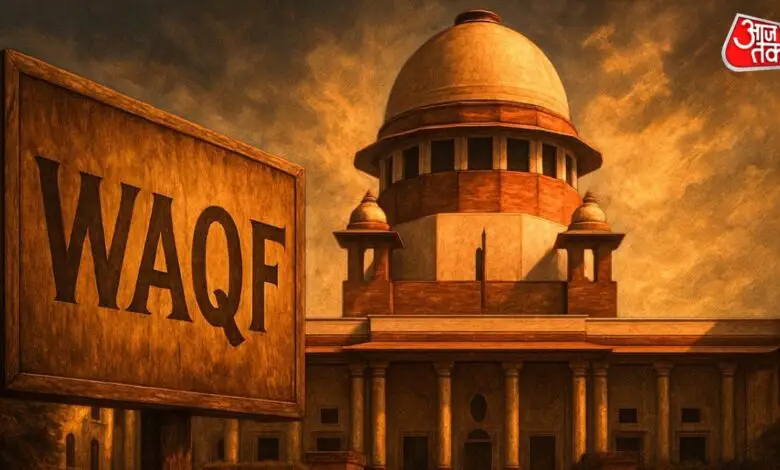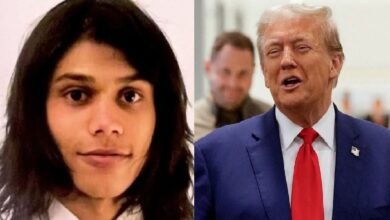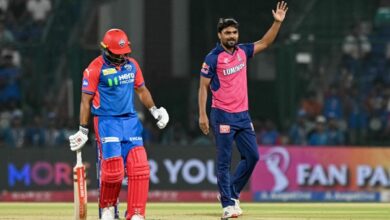CJI’s strict questions, the arguments of the Center … SC will be clear from the Waqf law or will it be stopped? Now tomorrow the hearing will be held – CJI TOUGH QUESTIONS Center Arguments will sc clea

A comment from the Supreme Court regarding the Waqf law has increased the difficulties of the central government. Today, the biggest hearing on the Waqf law was held in the country’s largest court. During the cross -examination of about 70 minutes, the petitioners made their arguments in protest against the Waqf law, the central government made its arguments and the Supreme Court asked the Central Government sharp and strong questions about the Waqf law. Due to lack of time today, the Waqf law is to be heard tomorrow. Tomorrow, the Supreme Court can issue an interim order regarding the Waqf law, but why the interim order did not come today, tell you its inside story.
Today, the Waqf law was heard in the country’s largest court. Before knowing what happened in the hearing, what arguments were given and what arguments were presented, we know why the Supreme Court today stopped the interim order regarding the Waqf law, why the court decided to continue the hearing before the order. In fact, today the Supreme Court had made up its mind to the interim order on the Waqf law.
The order was going to bring three trial
Today the order could have come about the three sanskars related to the Waqf law. First issue- Waqf bye user assets dinotification, second issue- The presence of non-Muslim members in the Waqf Board and the third issue is the rights given to the collector in the dispute of Waqf Property. The central government appealed to hear their arguments before issuing the order and due to lack of time, the court extended the hearing of the Waqf Act for further.
The hearing went on for about 70 minutes in the Supreme Court, which cleared one thing. The country’s largest court will issue an order regarding the Waqf law. Now the question is what will happen in the interim order. Will the Supreme Court stay on the Waqf law, will the Central Government get a shock from the Supreme Court, will the petitioners get relief on the Waqf law.
CJI asked sharp questions from the center
Many such questions are now arising before the Supreme Court order, but during the hearing in the court today, some pictures have been cleared from the strict and sharp questions of the Chief Justice from the Central Government. It is possible that after the hearing yesterday, the court orders came regarding the three sanskars of the Waqf Act. Any major order regarding the amendment made in number one- Waqf by user- Ban on the intergragist of the unreserved property of Waqf by user, stop the provision of more than two non-Muslim members in number three- Waqf Board and order in investigating the rights of the collector in investigating the controversial assets of more than two non-Muslim members and number four-Waqf’s disputed assets.
What were the arguments in the court today?
Now let us tell you what arguments were given in the court regarding Waqf by user and what questions were asked by the Supreme Court. First of all, Kapil Sibal said, ‘This is not so easy, Waqf has been created hundreds of years ago, now they will ask for the Waqf Deed of three hundred years old property, there is a problem here.’ On this, the Supreme Court said, ‘Why Waqf by users were removed, there are many old mosques. There are 14th and 16th century mosques, which will not have registration cell deeds. How to register such assets? The controversy will last longer on dismissing such a Waqf. We know that the old law was misused, but some are the right Waqf properties. If you finish it then there will be a problem.
In response, Tushar Mehta said that if any property is registered as Waqf Property, then the property of Waqf will remain. No one has been stopped from registration. In the first law that came in 1923, registration of property was also mandatory in it. It was also mandatory in 1954, 1995. Changes were made in 2013, registration was also mandatory in that. Then the Supreme Court asked the question that if a property is a Waqf by user and is not registered then what will happen to him, what is in the dispute of the property, there was no provision for the first registration of the British, in such a situation, what will happen, if a property is a user, then what will happen in that case?
Government said- Collector will investigate properties
It was replied by the government that the collector would investigate it and find that if it is government property, it will be corrected in revenue records. If someone has problems with the collector’s decision, then he can go to the tribunal. Then the Supreme Court asked what will happen to the property of Waqf by user. Tushar Mehta replied that if he is registered then Waqf has property, many property are registered in the name of Waqf by user.
On the argument of the Central Government, the Supreme Court asked the question that one thing is true that the assets of Waqf by user were misused, but on the other hand the Waqf by user property will also be correct. There are two aspects of it, you need an answer on this. It was replied by the government to see section 81. The tribunal is a judicial body. It has a judge and a person with knowledge of Muslim law. The judicial review has not been removed.
Three questions can come interim order
Finally, the Supreme Court commented that whatever properties have been declared Waqf by the court, they will not be considered non-wakef, whether it was done by Waqf by user or not. The Supreme Court will issue an interim order after listening to the arguments of both the parties on three questions regarding the Waqf law. First question- Should Waqf properties be allowed to be dinotified. In the focal point of this question, there are such Waqf properties which have been declared Waqf by the court or a Waqf property that is being in any court.
Second question- Should the rights of the collector be stopped in the event of controversy. The reason for this question is the new provision made in the Waqf law, which says that the collector will investigate the dispute standing on a Waqf property. This dispute is in relation to the disposal of government land or Waqf land. The big thing is that during the investigation, Waqf’s property will not be considered as a property of Waqf. Third question- Is the entry of non-Muslims in the Waqf Board is correct because there is a ban on the entry of non-Mazhabi people in other religions associated with other religions.
Non-constitutional stated to the entry of non-Muslims in Waqf Board
During the hearing, the entry of non-Muslims in the board has been described as non-constitutional on behalf of the petitioners. The argument was presented by Kapil Sibal that under the old law, all were Muslims in the board. All members in Hindu and Sikh boards are also Hindus and Sikhs. Non -Muslims have been placed in the name of special members in the new Waqf Amended Act. This new law is a direct violation of rights.
Regarding the plea of Kapil Sibal, the Supreme Court asked the central government counsel that according to this law, 8 members are Muslims. 2 judges cannot be Muslims. Then the rest are non-Muslim. The central government was replied that even then this bench cannot hear the case. The court objected to this and said, ‘What! When we sit here. We lose our religion. Both sides are the same for us. How can you compare this to judges? Then why not keep non-Muslims in the advisory board of Hindu settlement? Are you ready to make a statement before the court that the maximum 2 -mercury will be Muslim.
Now the hearing will be held tomorrow
In response, it was said on behalf of the central government, ‘I can register it in the affidavit.’ During the hearing, sharp questions were asked from the Central Government on behalf of the court. Even according to the new law, the Supreme Court has raised questions about the powers given to the collector. Now tomorrow the Waqf law will be heard in the Supreme Court. The questions of the Supreme Court will be answered by the Central Government. Now it is to see whether the Supreme Court issues the order regarding the Waqf Act after the Center’s reply.




